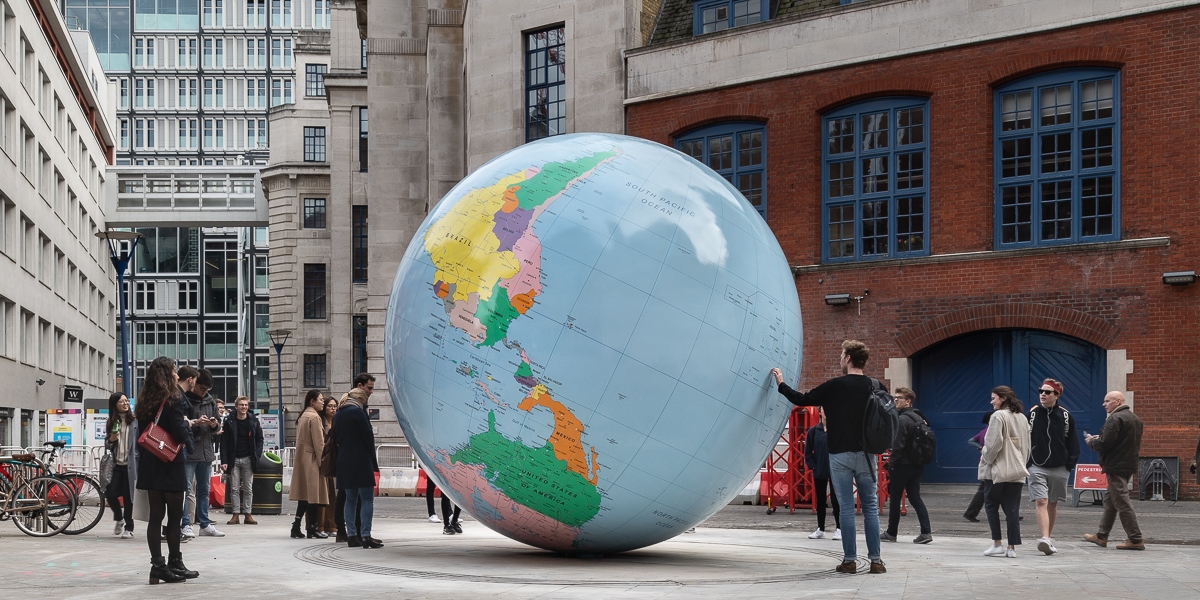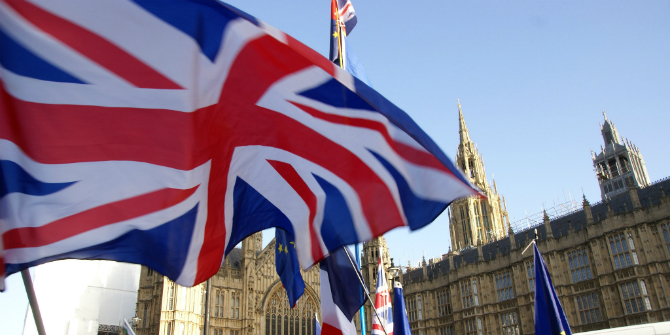Will Global Britain end up being Lesser Britain, asks Michael Cox (LSE)? In this blog, he points to the high international price the UK will be paying for Brexit. ‘Global Britain’ will be a ‘Lesser Britain’, he concludes.
One of the many claims made in favour of Brexit was not just that it would allow the UK to save a lot of money, take back control and regulate the flow of people ‘flooding into our island nation’, but that it would free Britain from the shackles, which had hitherto been imposed on it by Brussels. As a result, a newly independent nation would now be able to stride confidently forward and take its rightful place on the world stage alongside other great powers in whose company it clearly deserved to be.
But attendance at a first-year class in International Relations at LSE – IR100 to give its correct name – might have suggested that the reasoning behind all this was deeply flawed. There has been much work done on how Brexit has already impacted the UK economy and will do so in the future, and none of the news thus far has been encouraging. But of equal importance is the impact it has had, and will continue to have, on its position in an international system that rewards success but punishes mistakes with uncompromising brutality. Great Britain, of course, still possesses some important assets from its military to its universities; it also remains one of the five permanent members of the UN Security Council, is the sixth-largest economy in the world, and as British officials constantly stress (more so than ever since the UK left the EU) plays a central role in the NATO alliance. Moreover, unlike all the other EU countries, it is a member of a very special club alongside the Americans to which the EU does not belong: the Five Eyes intelligence alliance.

Still, there is no getting away from the fact that having “punched itself in the face” as one American economist rather brutally put it, the UK is now having to live with the consequences. Working on the rather dubious (and contradictory) assumptions that geography no longer mattered in a globalized world – and that the economic future of the world lay outside Europe – the Brexiteers managed to pull off a major political coup in June 2016 with little thought, one suspects, of the impact this would then have on Britain’s international standing. But as us IR ‘experts’ feared at the time, the very act of the UK removing itself from the EU looked from a geopolitical point of view to be decidedly odd, if not downright counterproductive – in part, because it reduced the UK’s usefulness to its most important ally and benefactor the United States, in part because it appeared to be premised on the belief that a new deal with the biggest emerging economy in the world (China) would be a cinch, and last but by no means least, because it seemed to bring a smile to the face of those back in a Russia who had by 2016 made clear their hostility to a liberal grouping the UK was itself intent on leaving.
Those who made the case for departing the EU may, of course, take temporary comfort from the fact that Europe has been slower than the UK in rolling out the vaccines to combat COVID. Others, meanwhile, have pointed to how much capital has flown out of Europe proving at least in their minds that the EU is on the economic slide. A recent report from Chatham House has also suggested that whereas the EU and the US could easily fall out when it comes to relations with China, the UK might find it easier to align its (now) more hard-line position with that now being adopted in Washington. But that is by no means a given. Indeed, judging by its own recently published security strategy, London hardly looks as if it is willing to forego some kind of an economic relationship with China for the dubious benefits of waging a new cold war alongside a Washington, which despite the many obvious differences it has with Beijing, still sees the possibility of some form of collaboration with the PRC. Nor is it so obvious that the EU will not finally align its position with the US.
All of which points to the rather obvious conclusion that the UK (unlike the US) has limited options and even fewer choices going forward. Going it alone while taking regular potshots at the EU – some justified to be sure – might appeal to the gallery. But this does not change the simple fact that it now confronts an increasingly challenging international environment made up of an America in whose eyes it is now much less of an asset (Obama did warn that the UK might move to the ‘back of the queue’), a European Union which no longer trusts it (and is now looking for its pound of flesh), and a China too powerful to be pushed around or lectured at by a country with an economy only a fifth or a sixth the size of the PRC’s. One might also add that with an Irish-American now in the White House, the Brexiteers have not only lost one of their only allies in the shape of Trump but face a President who has been studiously silent on the question of a new trade deal but remarkably forthcoming about his deep ties to the land of his ancestors from Ballina, County Mayo. Certainly, with Biden in command and Irish-America keeping a watchful eye on the ‘Brits’, the government in London are unlikely to be cut any slack when it comes to doing a deal to appease an increasingly angry unionist community in Northern Ireland. But as critics have been quick to point out – more in sadness than in anger in my case – if the English were misguided enough to leave the biggest democratic and economic club in the world in which the UK had played a key role, whose members quite literally begged for it to remain, and through which it had amplified its voice in Washington, there would, in the end, be a price to pay. The only question remaining is how high will that price be and for how long will the UK be paying it?
This post represents the views of the author(s) and not those of the Brexit blog, nor of the LSE. It is extracted from a longer paper published by the Brexit Institute, Dublin City University. Working Paper no.8 2021. ‘Brexit, and the Crisis of the Transatlantic Relationship’.







Times have changed since the Pilgrim Fathers but the human spirit still has the yearning for freedom.
Better to sail in the ocean than have the tide wash you like flotsam on the quick sanded beaches of the European Union.
“the English were misguided enough to leave the biggest democratic and economic club in the world “…”democratic”. Surely some mistake here (Editor)
It is a funny sort of democracy in which some members are seen to be controlling the agenda. and in which disribution of taxes appear to be so loose that rhey appear unacountable.It must be wonderful to be in the bosum of a large inneficient community where everyone seems happy and safe from harm. I will not criticise the population of the EU as clearly they are being mislead by politicians every bit and more so than the British.
You can’t have it both ways; you postulate that the EU is a either an undemocratic monolith that sucks states in – or the MS have such autonomy as to bully the EU hither and thither. The truth is clearly more subtle and nuanced than anyone in GB seems prepared to consider?
The EU is indeed a complex product of a group objective to have control of the peoples of Europe. From simple trading and friendship it has evolved into as you say ( a monolith that sucks states in ). Clever in its managemement and in the wording of all the many edicts it issues.
No one bullies the EU as it is not a state, just an organisation of states that as you say, allows themselves to be bullied.
Are the people of the EU happy with their lot?
Does every state enjoy the same benefits?
Are the states treated equally?
Why does the EU allow the destruction of such things as the sea
bed environment of 3rd World areas?
Do the states each have a fair allocation of natural resources?
If the EU is so beneficial,why are nearby countries not applying to
join in full?
Subtle and nuanced it is to whose benefit?
Answers please, cross questions.after.
Very nicely said by Prof Cox.
Pinch points clearly are
strategic – future relations with China and Russia seen through the prism of non EU membership.
institutional – to what extent was UK membership of EU an asset in the day to day management of NATO activity, and how will this change? NATO and EU have been closely ‘related’, with NATO as the quiet support structure for EU (and most of its enlargements) since the 1950s…or will NATO really be enhanced at expense of EU?
I call it ‘Little Britain’ rather than ‘Lesser Britain’. A clearer description of the current status of affairs
“if the English were misguided enough to leave the biggest democratic and economic club in the world in which the UK had played a key role, whose members quite literally begged for it to remain” I wonder which members those were who begged the UK to remain? After the 2016 referendum the message I heard was more “don’t hang around, and don’t slam the door on your way out”. See for example https://www.bbc.com/news/world-europe-36626409